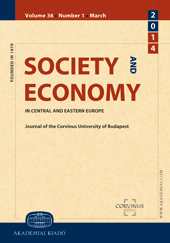Putting the success stories in the post-communist world into a broader perspective
Putting the success stories in the post-communist world into a broader perspective
Author(s): Vladimir PopovSubject(s): Economy, National Economy, Economic development
Published by: Akadémiai Kiadó
Keywords: transition; growth diagnostics; path dependency;
Summary/Abstract: There are at least three reasons why many transition economies succeeded by pursuing policies that are very different from radical economic liberalization (shock therapy), which is normally credited for the economic success of Central European countries. First, optimal policies are context dependent, specific for each stage of development, so what worked in Slovenia cannot be expected to work in Mongolia. Second, even for countries at the same level of development, reforms needed to stimulate growth are different; they depend on the previous history and on the path chosen. The reduction of government expenditure as a share of GDP did not undermine significantly the institutional capacity of the state in China, but in Russia and other CIS states it turned out to be ruinous. It is the growth diagnostics that should reveal the missing ingredient of economic growth. Introducing this “missing ingredient” should not, however, result in the destruction of other pre-conditions for growth. The art of the policymaker is to create markets without causing government failure, like it happened in many CIS countries. Third and most importantly, there are long-term trajectories of development that are path dependent: once the country gets on a particular trajectory, it is sometimes better to stay on track because the costs of a transition to a seemingly superior trajectory may be prohibitively high.
Journal: Society and Economy. In Central and Eastern Europe ǀ Journal of the Corvinus University of Budapest
- Issue Year: 32/2010
- Issue No: 1
- Page Range: 83-102
- Page Count: 20
- Language: English

